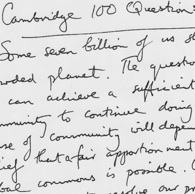


Recent News
December 15th, 2011
October 20th, 2011
May 23rd, 2011
April 14th, 2011
March 2nd, 2011
Cambridge 100 Questions Project
by Mike Peirce
 What are the most important questions we need to focus on so that we thrive together in the future?
What are the most important questions we need to focus on so that we thrive together in the future?
A good answer needs a good question. The Cambridge 100 Questions Project was launched in May 2009 at the St. James’s Palace Nobel Laureate Symposium, with the aim of asking some of the finest creative minds of our time to identify the most pressing questions facing the world today.
This year long initiative, led by the Cambridge Programme for Sustainability Leadership, has begun with contributions from Nobel Laureates and many of the world’s leaders from business, government, academia and civil society. Over the next 12 months, the project will widen its scope to draw on the collective genius of thousands of people from across the world. The ambition is not to solve these questions, but to learn from their being posed: to explore and envision the key questions at the tipping point of creating a sustainable world.
The project is particularly interested in questions that offer a sense of realistic optimism and collective endeavour – suggesting a compelling vision of how the world is changing and how society could adapt itself to new circumstances.
The launch of the project was accompanied by the first showing of a specially commissioned installation by artists Tracey Rowledge and Carl Clerkin. This piece vividly displays some of the questions provided by guests at the Symposium and will continue to inspire debate and argument. Through a variety of public meetings and the use of an innovative online tool, people from across the world will be able to share and discuss questions. By the summer of 2010, these questions will be grouped and analysed to generate a list of the 100 most important questions on which society needs to focus.
For more information on how to participate in the project, please contact Mike Peirce – mike.peirce@cpsl.cam.ac.uk, Deputy Director, Cambridge Programme for Sustainability Leadership; or visit www.nobelcause.org to register your interest.
To whet your appetite for the conversation, please see a selection of questions that were generated during the Nobel Laureate Symposium.
Prof Richard Ernst
How
can we motivate ourselves and our fellow citizens to adopt a life style
that respects the long-term needs of society, compatible with the
limitations of our globe, instead of pursuing a selfish ego trip, as
its is most common today, and has led to the present untenable global
situation?
Prof David Gross
Can we build an economic and political system that is not dependent on unlimited consumption and growth?
Prof Walter Kohn
How can we generate clean renewable energy causing no global warming, especially through sun and wind?
Prof Sir Harry Kroto
How do we reduce the global population to be commensurate with viable sustainability?
Prof Yuan T Lee
With
the fast changing climate and environment, is it true that the only way
the human species could avoid the fate of ‘extinction’ is to manage to
slow down the change of the environment?
Prof Eric Maskin
Assuming
that a comprehensive international agreement on carbon emissions is
reached, can we devise a creative mechanism to ensure that signatories
will, in act fact comply with that agreement?
Prof Wangari Maathai
What
would be the cost to the least developed countries if they ignored the
drivers of climate change in their countries and abandoned the
challenge to developed and emerging economies?
Prof Mario Molina
What
will it take to convince world leaders (and the population at large)
that it would be highly irresponsible for our generation to continue
depleting natural resources and damaging the environment – and the
atmosphere – at the risk of causing nearly irreversible changes to the
earth’s system that would make it extremely difficult for future
generations to prosper?
Prof Douglas Osheroff
Since
the dawn of the industrial revolution mankind has taken from the Earth
a treasure trove of natural resources to build its cities and run its
factories. Our appetite for energy has doubled and re-doubled, both as
our numbers and our wants have grown. In the process we have poisoned
the air, the water and the soil that support all living things. Indeed,
human activity has diminished the diversity of life on the Earth.
Global warming is simply the response of climate to the unwanted
by-product of our energy production. The precise consequences of global
warming are uncertain, but changes in climate are likely to diminish
our ability to grow the food we need for life. We must ask and ask
again: Is this the legacy that we wish to leave to our children?
Prof John Polanyi
Some
seven billion of us share this crowded planet. The question is whether
we can achieve a sufficient sense of community to continue doing so.
This sense of community will depend on the belief that a fair
apportionment of the global commons is possible. Only then can we hope
to resolve our problems by law, rather than war. Is our species capable
of the necessary generosity of spirit? Answered aright that question
could lead to a global civilisation that is sustainable, and worthy of
being sustained
Prof Burton Richter
How can the rapidly growing countries of the developing world join in greenhouse gas emissions control?
Prof F Sherwood Rowland
What is the ideal human population of the earth?
Prof Tom Schelling
Do
we know enough about underground storage to be able to identify
underground sites where CO2 will stay secure? And will there need to
be, in China, Russia, India and the USA, early geological mapping of
potential storage sites? And how important will it be to locate new
coal-fired powerplants in storage-appropriate locations?
Prof Wole Soyinka
Is
it complete fantasizing to envisage a development here the complex
off-shore oil technology makes way for, or is adapted for power
generating plants based on the motion of ocean waves?
Prof Jack Steinberger
How can we best reduce the global population (without the use of nuclear weapons)?
Tariq Banuri, United Nations
Given
that we live in a highly unequal world, the promise of economic
development is both a social need in developing countries and a
political need for maintaining global political and social stability.
The key question then is how to ensure that the process of economic
development (and consequently that of economic, social and political
convergence between the North and South) does not get derailed either
by climate change or by climate policy?
Sir Richard Branson, Virgin
What
is the one piece of irrefutable evidence that knocks the climate change
sceptics' arguments on the head? Is it the fact that sea levels are
rising? James Lovelock believes this is the clearest demonstration of
the Earth's rising temperature.
Jean Brittingham, Director North America, Cambridge Programme for Sustainability Leadership
How can we build an optimistic shared vision of the future?
Cynthia Carroll, Chief Executive, Anglo American
The
current economic crisis will reduce the resources available to fight
poverty in the developing world, and is already having detrimental
effects on investments, jobs exports and growth in emerging markets.
Is there a more sustainable approach to fighting poverty, and what is
the role for business and government?
Polly Courtice, Director, Cambridge Programme for Sustainability Leadership
What one historical event or period will give us the greatest insight into how to make the transition to a sustainable society?
Michaela Crimmins, RSA Arts and Ecology Centre
Leadership
– better networks – financial support – cross disciplinary
collaboration – new policies … What are the most effective means of
ensuring we have the capabilities of the arts sector in working for a
more sustainable and equitable future?
Bill Dunster, ZEDfactory
Is
it now possible to allocate the number of days of a human life saved
with every tonne of CO2 emissions to the atmosphere saved?
Riane Eisler, President, Center for Partnership Studies
How
do we create a fundamental cultural shift so that the life-sustaining
work of caring for people and for nature is given real visibility and
value in economic systems (measurements, policies, and practices)?
John Elkington, co-founder, Environmental Data Services, SustainAbility, Volans
Since
I began working on the environmental and sustainability fronts, 40
years ago, a number of former miracle industries have been hounded into
extinction because of their health or environmental impacts: asbestos
(once helped save lives in fires), CFCs (once hailed as infinitely
safer than earlier aerosol propellants), tetraethyl lead (one-time boon
to fuel efficiency). Things we were told were irreplaceable were
replaced. So which of today’s miracle industries and irreplaceable
technologies will we need to kill off next, how will we replace
them—and where will we see the true green shoots of the Phoenix Economy
that will rise from the ashes of the old?”
Caroline Fiennes, Global Cool
How can we get energy without emitting carbon?
Stuart Franklin
Why
don’t those engaged in sustainable resource management not examine
literacy, education and local advocacy? Is there a correlation between
environmental destruction and local illiteracy?
Lord Giddens, London School of Economics
How
can we introduce the long-term planning needed to create a low-carbon
economy with out falling into the traps that discredited planning in
the 1960s and 1970s?
David Gordon-Macleod, Foreign & Commonwealth Office
It
is a well established fact that deforestation of tropical rainforests
releases considerably more CO2 annually than the whole global transport
sector. An important way to reduce the rate of deforestation would be
to establish a carbon trading system which effectively pays tropical
rainforest countries to conserve and preserve their forests. What are
the essential preconditions for establishing a carbon trading system,
and how can it be made to work effectively in the interest o all
parties concerned, including of course the creditors and recipients of
the credits?
Prof Michael Grubb, Chief Economist, The Carbon Trust
What institutional or media structures can better connect the ‘how to respond’ debate in different countries?
Jeffrey Hollander, Seventh Generation
How
will we define “progress” to ensure we use a system of holistic metrics
rather than the compartmentalized non-systemic ones currently in use
(i.e. GDP, Dow Index.)
How will we transition to a system of “full cost accounting” that prevents the externalization of costs?
What
type of global governance is required to ensure a sustainable, just and
equitable future for our planet and all its inhabitants?
How will we need to redesign “education” to ensure we develop minds that are able to think systemically and holistically?
Charles Holmes, Dalai Lama Center for Peace and Education
What
are the leadership transformations we each need to make in ourselves,
to build the business and communities that we can all be proud of?
Tony Juniper, Senior Associate, University of Cambridge Programme for Sustainability Leadership
What
political institutions and processes are necessary for us to make the
transition to a society that will be able to meet the needs of the nine
billion people who will live on Earth by 2050 without destroying the
natural life support systems that enable us to thrive?
Klaus Lackner, Director, The Earth Institute at Columbia University
How does one measure the sustainability of a new technology?
Jeremy Leggett, Director, Solar Century
Can we grow GDP as currently defined, grow shareholder value as currently defined, and decarbonise economies as we must?
Ian Leslie, University of Cambridge
Shouldn’t
we augment developing top-down regulation and treaties with inducing
bottom-up technological and social innovation to build a global low
carbon economy in what is a globally disparate and fragmented market?
Dr Caroline Lucas, Green Party Leader and MEP for the South East of England
The
current political system seems incapable of addressing the climate
crisis, because it is constrained by parameters of what it perceives to
be ‘politically possible’. How do we urgently change those parameters?
Jon McClure, Reverend and the Makers
Is
debate on climate change futile without a concerted attempt to win
public hearts and minds and drive the media agenda away from banal
celebrity culture and towards the environmental emergency we face?
David MacKay, University of Cambridge
Why can’t we transfer the military budgets to the great energy rebuild?
Nick Main, Chairman, Deloitte New Zealand
How do we fit 9 billion people on one planet?
Kevin McCullough, Chief Operating Officer, RWE Innogy Gmbh
How
do we convince the world to move away from today’s norms of short term
business performance indicators where we typically measure success in
quarters or years, to one where we have new value systems where success
is measured by the quality of our legacy – measured in decades or
centuries?
Dirk Messner, Director, German Development Institute
Cooperation
and conscious problem solving is always based on ‘we-identities’. Will
we be able t build a ‘global we-identity’ to solve the climate crisis?
Andrew Mitchell, Director, Global Canopy Programme
How can tropical forests become worth more alive than dead?
If we can make a market in a public poison (carbon), how can we make a market in a public good (nature)?
Michael Otto, Chairman, Otto Group
How can values such as humility, responsibility and solidarity be re-developed in an affluent society?
Gifford Pinchot III, President, Bainbridge Graduate Institute
How might we focus people’s attention on achieving happiness rather than on acquiring stuff?
Jonathon Porrit, Chair, Sustainable Development Commission
How
significant would it be if the world’s major religions and faith
communities became fully engaged (indeed, militantly engaged!) in
enabling societies to embrace low-carbon, sustainable living?
Prof Jorgen Randers, Professor of Climate Strategy, Norwegian School of Management BI
How do we make humanity respond quickly to the climate challenge?
Chris Rapley, Director, Science Museum
How
can we develop and exploit modern communications technology to connect
individuals with the consequences on Earth's life support systems of
their lifestyles and actions in a sufficiently vivid and credible way
to shift behaviour to sustainability?
Prof Simon Schama, Columbia University
How
do we mobilize culture - pop and high – to create the words, images
and music – that will make the destruction of the planet and its
irreversible loss to our posterity, the cause of the world’s people?
Prof John Schellnhuber, Director, Potsdam Impact for Climate Impact Research
Are there sustainable ways of restoring the pre-industrial atmosphere in good time?
Sarah Severn, Director of Horizons, Corporate Responsibility
How might we break through the paradigm of continuous economic growth as the only viable future for humanity?
Lord Stern, London School of Economics
How
can we build and sustain the greatest collaboration the world has ever
seen, in other words the construction and delivery on an effective,
efficient and equitable global agreement on climate change? If we fail
we will be condemning future generations to extended and destructive
global hardships and conflict.
Pavan Sukhdev, Study Leader, The Economics of Ecosystems and Biodiversity, UNEP-World Conservation Monitoring Centre
How
can we translate our knowledge about the linkages between Man and
Nature, e.g. our understanding of the benefits ecosystem services
provide, into policies that encourage and enable us to better manage
this planet's treasures instead of wasting them?
William Waldegrave, Chairman of Board of Trustees, Science Museum
Can human aggression be eradicated without eradicating human creativity?
